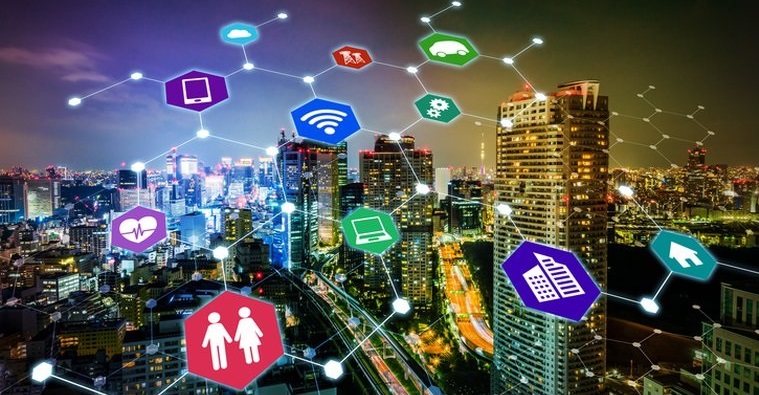In a tech-driven era, the concept of a smart city is now a reality. The idea of smart cities is picking up momentum for increasing citizen safety, promoting sustainability, and improving the quality of life in general.
But the question is: How does this happen?
Various technologies work in symphony to produce these positive results — and one such innovative solution is digital signage.
Digital displays make it easy to communicate with the public in real time, improve wayfinding around town, and even ensure safety during emergencies and threats. Let’s dive a little deeper into how it does this.
The role of digital signage in smart cities
Digital signage solutions are often mistakenly seen as a purely marketing tool. In reality, digital signage is a digital communications solution that brings critical information at the right time to its audience.
In smart cities, it becomes a dynamic platform that engages citizens, streamlines information dissemination, and enhances the overall urban experience. Here’s how the integration of digital signage is contributing to the development of smarter, more connected cities:
1. Empower citizens with real-time information
Picture this: Commuters are on their way to work. They glance at a digital screen nearby and see the bus schedules. The displays have detailed information on arrival time, distance, departure routes, and estimated travel time that get updated automatically with every change!
Commuters can also use their smartphones to scan QR codes, get more details on when their bus will arrive, and plan their commute more efficiently. This is the power of digital signage in a smart city — empowering citizens with instant access to crucial information, like event notifications, transport schedules, or daily announcements. It’s about staying connected and informed in the fast-paced rhythm of urban life.
2. Simplify wayfinding for hassle-free navigation
With so many lanes to navigate, roads to take, and hundreds of hotspots, wayfinding can be a bit of a hassle in busy cities. This could lead to frustration and confusion.
Here’s where digital signage comes in. Smart cities address navigation challenges with signage that goes beyond static maps. You can install interactive kiosks to help civilians with accurate, on-the-spot directions, squashing any doubts or confusion.
But that’s not all. These displays provide more than just directions — they also highlight nearby points of interest and more eco-friendly transportation options. So, whether it’s a local or a tourist who needs directions, these digital wayfinding solutions make navigation a breeze, promoting hassle-free urban exploration and even sustainable traveling options.
3. Monitor environmental conditions for healthier urban living
Urban cities have a detailed citizen safety plan. These plans prioritize neighborhood safety and digital signage plays a key role in ensuring healthier urban living.
Imagine a digital display showing real-time air quality and temperature information. Beyond mere data, it is a means for citizens to make informed decisions about outdoor activities. Whether someone is deciding the right time for a jog or an evening stroll with the kids, digital signage transforms environmental monitoring into actionable insights.
Additionally, when people see reports like high air quality index, they’re more conscious about the impact of lifestyle choices on the environment. This helps nudge them towards a more eco-friendly commute, contributing to a healthier urban environment.
4. Ensure public safety and security with emergency alerts
In times of crisis, an effective emergency communication system is crucial. You need to reach your audience as fast as possible to ensure safety.
Digital signage doubles as an emergency communication solution during emergency situations like natural disasters or security threats. Think about a digital sign flashing emergency alerts, directing people away from potential hazards and providing safety updates.
In seconds, you can override your current signage to display emergency messages like evacuation routes, best practices, and safety shelters. Digital signage becomes a real-time lifeline, ensuring that citizens are well-informed and able to respond swiftly to emergencies.
5. Boost community engagement for a stronger civic connection
It’s no secret – urban cities are vibrant hubs of community life. Think of digital signage as a catalyst for this vibrancy.
Imagine strolling through a city square and encountering a digital display promoting local events, cultural activities, and community initiatives. These displays showcase messages and open invitations for citizens to participate in these events.
For example, if the annual bake-off is around the corner, you can share updates on the dates, venue, and participation criteria. You can also share QR codes where participants can fill out forms in seconds!
On the day of the event, you can livestream it on your city’s display network to boost engagement and foster community-building. Additionally, you can celebrate event winners for recognition and even acknowledge donors for their generous contributions.
Conclusion: A connected future beckons
As smart cities continue to evolve, digital signage plays a transformative role in shaping urban communities. This solution contributes majorly towards enhancing public services, communication, and overall urban living.
Moving forward, we see digital signage playing an integral part in urban city planning because of its versatile benefits. This solution beats other legacy communication systems because of its ability to adapt to the fast-changing environments that smart cities are built upon.
We’re excited to see the future of digital signage integration in smart cities. Are you?

